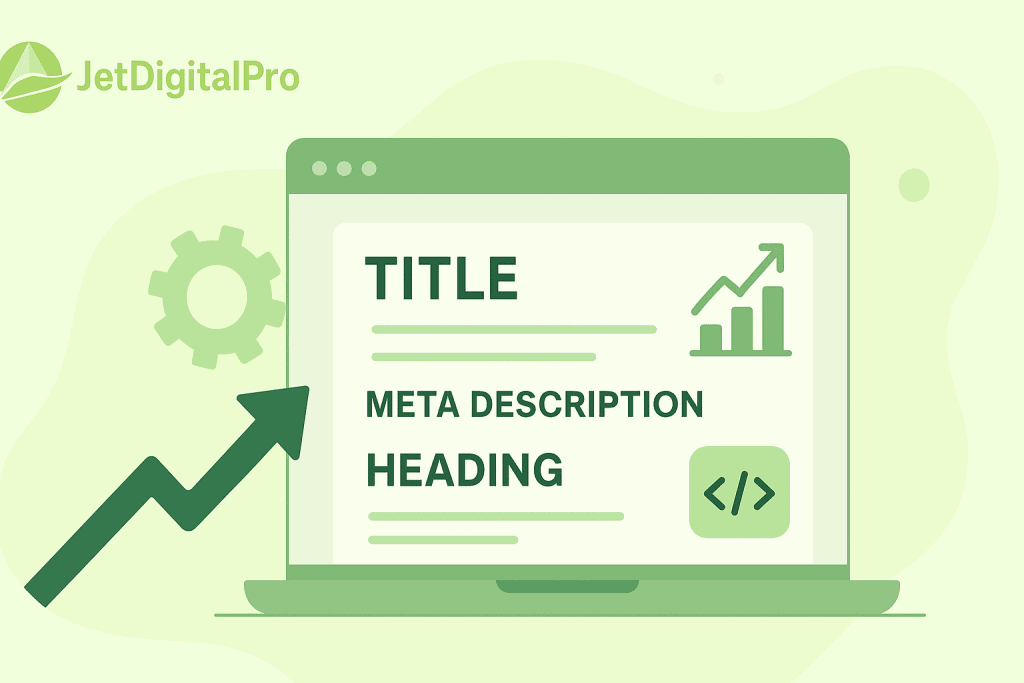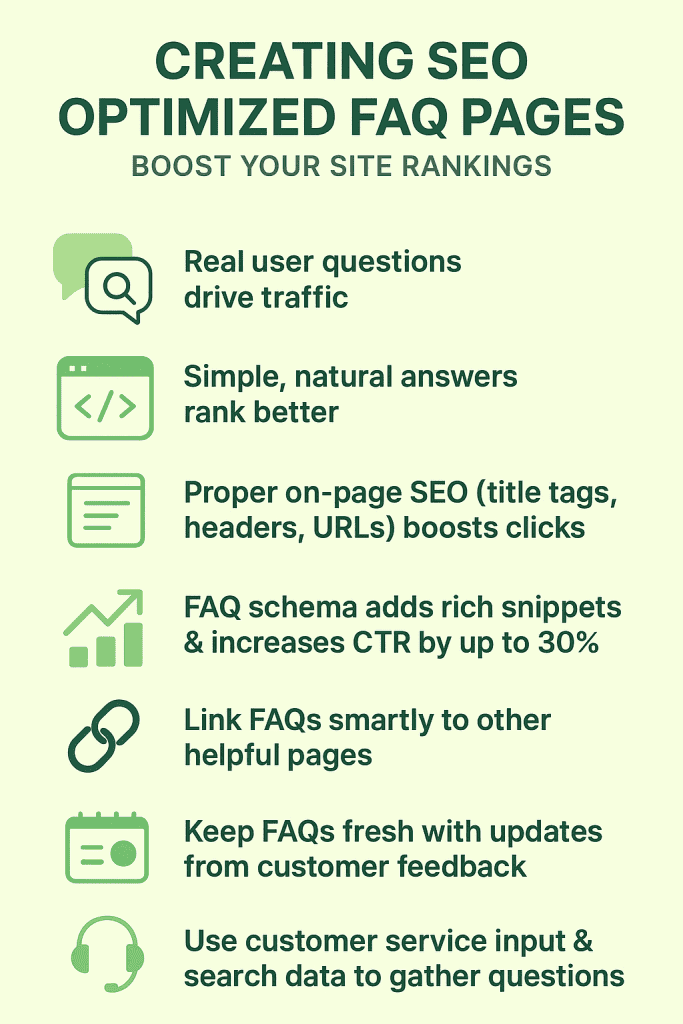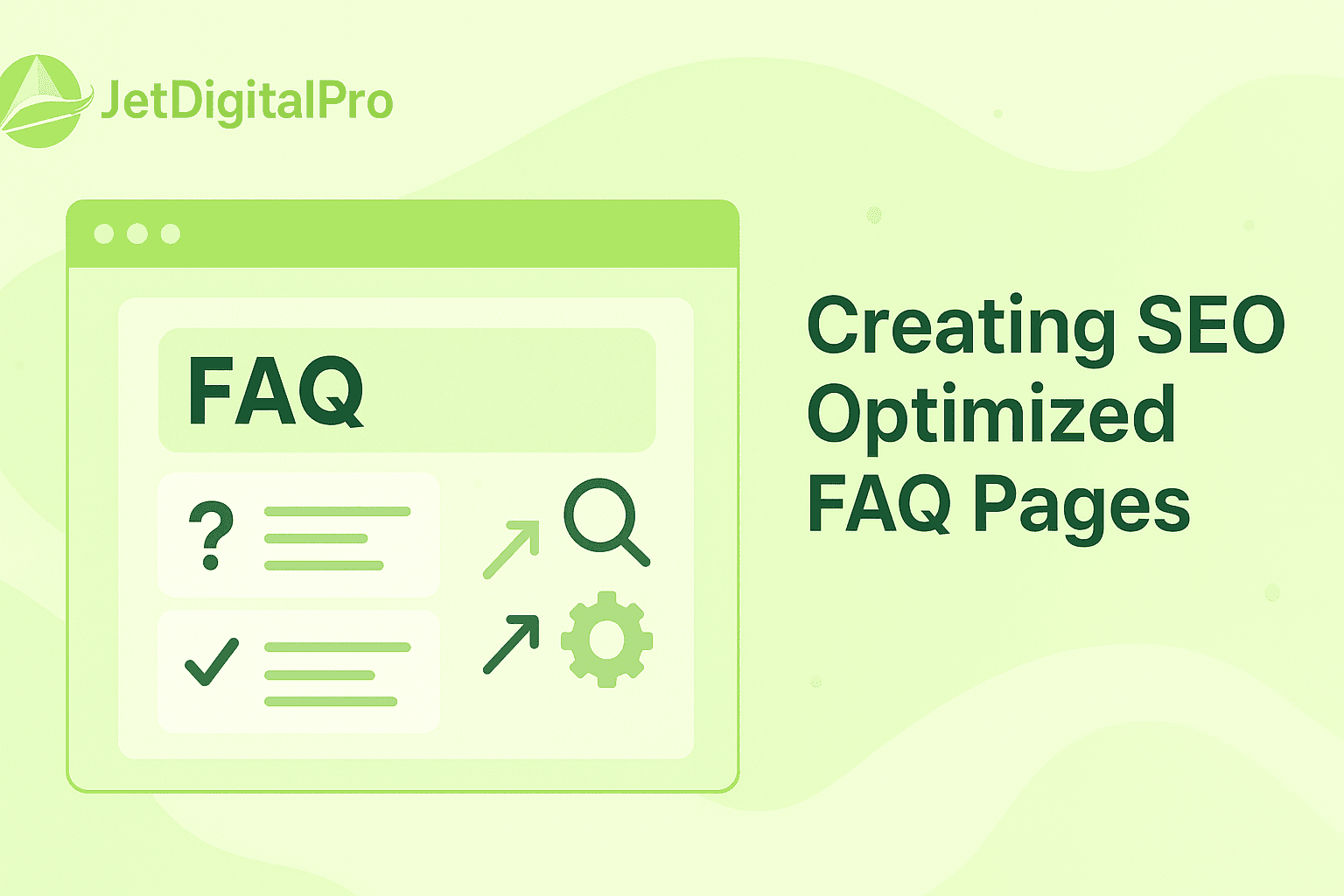This is the brief on mastering FAQ SEO. You know those simple, straightforward FAQ pages. They can pull in a ton of traffic. That’s because when people search online, they’re just looking for direct, honest answers, no fluff. The whole approach is actually pretty simple. Find out what people are really asking, write clear answers, and organize it all logically.
First up, your content has to be driven by real, user questions. Seriously, stop guessing. The best place to find these? Your own sales and support teams. I mean, they hear the same problems every single day. Also take a look at what people are typing into your website search bar and what Google suggests.
Alright, second, you’ve got to craft clear, conversational answers. Look, short answers always win. Nobody wants to read a wall of text, right? So aim for just two or three sentences. And please, write like you’re talking to a friend. Skip all that corporate jargon.
And finally, let’s get a little technical. You need to use something called schema code. Think of it like a cheat sheet for Google that helps your answer show up directly in the search results. Getting this right can boost your click-through rates by up to 30%.
FAQ pages succeed by directly answering the questions people are actually asking, which is why they can attract significant organic traffic. The process is straightforward: first, source real questions from your sales and support teams, not guesses.
Second, craft clear, conversational answers that avoid jargon. Finally, implement FAQ schema code to help search engines feature your answers directly in results.
This combination of genuine research, plain language, and simple tech leads to more visibility and happier users. Keep reading for a detailed breakdown, or for a visual walkthrough of these three steps, watch our brief video guide.
Key Takeaways
- Real user questions drive better traffic than guesswork
- Simple, natural answers rank better than keyword-stuffed content
- Good technical setup helps Google show your answers in search results
1. Understand Your Audience & Their Questions
Finding out what people actually want to know beats trying to guess their questions. Our team starts by asking the folks who talk to customers every day, the sales and support teams. These people hear the same questions over and over, making them perfect sources.
We mix this with feedback from real customers through surveys and emails. Looking at what people type into the website search bar helps too. Even browsing Reddit threads about your industry can give you ideas about what confuses people. Google’s suggested questions show what others are asking about similar topics.
Quick checklist to start with:
- Ask your support team what they explain most often
- Check recent customer emails and feedback
- Look at your site’s search terms
- Browse industry forums
- Check Google’s question suggestions
💡 Pro Tip: Focus on solving real problems people mention frequently, not just what you think they might ask
2. Craft Clear, Concise, and User-Friendly Answers

Nobody reads walls of text anymore. Based on what works for our clients, short answers win every time. When someone asks about shipping costs, they want numbers, not a novel. Break down complex stuff into bite-sized chunks. Got a tricky topic? Link it to a full article instead of cramming everything onto your FAQ page.
Write like you’re talking to someone at a coffee shop, casual but professional. Skip the fancy industry talk. Our clients see better results when they keep things simple, often leveraging SEO article content writing services to maintain clarity and search-friendly structure across pages.
Quick writing tips:
- Aim for 2-3 sentences per answer
- Skip the business speak
- Split big topics into smaller questions
- Write like you talk
💡 Pro Tip: Keep it straight to the point, imagine explaining something to a friend who’s in a hurry
3. Use Keywords That Make Sense
Keywords matter, but don’t go crazy with them. Think about how real people search online. If someone’s looking for help with FAQ pages, they might type “how to make FAQ page” or “FAQ page examples.” Use those exact phrases where they fit naturally.
Mix up your wording to cover different ways people search. Instead of repeating “FAQ page tips” ten times, try “help with FAQ pages” or “FAQ page guide.” It reads better and catches more searches.
Basic keyword tips:
- Check what terms people actually search for
- Put keywords where they make sense
- Don’t repeat the same phrase too much
- Use normal variations
💡 Pro Tip: Google’s search bar suggestions show real phrases people use, they’re gold for finding natural keywords
“67% of customers prefer self-service over speaking to a company representative.”
– HubSpot Research [1]
4. Optimize On-Page SEO Elements

The nuts and bolts of SEO still count. Our tests show that pages with clear titles and descriptions get more clicks. Put your main topic right at the front of your title tag, if you’re writing about phone repairs, say “Phone Repair FAQ, Common Issues & Solutions.” The description should tell people exactly what they’ll learn.
Use headers like you’d organize a textbook, big topic first, then subtopics below. Keeping your page address simple, such as website.com/faq-phones, aligns with best practices in technical SEO content writing and ensures Google can interpret your page structure efficiently.
What to fix first:
- Put your topic in the page title
- Write a description that makes people want to click
- Use clear headers for each section
- Keep page addresses simple
💡 Pro Tip: Your page description should sound like a friend recommending the page, not a robot
5. Add FAQ Schema Code
Schema code’s a bit technical, but it’s worth doing. It’s like giving Google a cheat sheet about your FAQ page. When you do it right, your answers might show up right in Google’s search results, those little dropdown boxes you sometimes see.
Just make sure you’re following Google’s rules. One wrong bit of code and the whole thing might not work.
“Structured data is a standardized format for providing information about a page and classifying the page content.”
– Google Search Central [3]
Basic schema steps:
- Copy the right code format (JSON-LD works best)
- Check Google’s rules
- Test it before going live
💡 Pro Tip: Double-check your code after updating your FAQs, one tiny error can break the whole thing
Implementing FAQ schema can boost click-through rates by up to 30% when done correctly. [2]
6. Link to Other Helpful Pages

Smart linking makes your FAQ page work harder. When someone reads about shipping times, drop in a natural link to your shipping policy page. Or if they’re checking warranty info, point them to your full warranty guide. This approach mirrors strategies used by top platforms for SEO writers to enhance internal linking and improve overall content discoverability.
Our clients see better results when they:
- Use real words in their links
- Connect to pages that actually help
- Add quick jumps to different FAQ sections
💡 Pro Tip: Skip the “click here” stuff, use words that tell people where they’re going
7. Keep Your FAQs Fresh
FAQs get stale fast. What worked last year might not cut it now. We check our clients’ FAQ pages every couple months, swapping old answers for new ones and adding stuff people keep asking about.
Watch what brings people to your page and what they do once they get there. Google Analytics shows which questions people actually read and which ones they skip.
Regular updates should:
- Add new common questions from customers
- Fix old answers that don’t work anymore
- Drop questions nobody asks about
💡 Pro Tip: Check your customer service tickets monthly, they’ll tell you what new questions to add
FAQ
How can FAQ page SEO improve my website’s search visibility while keeping content relevant for users?
FAQ page SEO focuses on creating structured, SEO friendly FAQ pages that answer user questions clearly and efficiently. By applying SEO FAQ best practices like FAQ schema markup, on-page SEO FAQ techniques, and keyword placement in FAQ question keywords, websites can increase organic search visibility, boost FAQ page ranking, and improve FAQ click-through rate while providing FAQ content relevance and better FAQ user experience.
What steps are essential for SEO content FAQ optimization without making the page look cluttered?
Optimizing FAQ content requires following SEO FAQ content strategy, proper FAQ heading tags, FAQ bullet points SEO, and FAQ page layout techniques. Using structured data FAQ, FAQ meta description, and FAQ schema benefits helps search engines understand the content. FAQ internal linking, conversational FAQ keywords, and FAQ answer optimization improve FAQ user engagement and reduce FAQ bounce rate without overloading the page.
How does FAQ schema markup contribute to rich snippets and featured snippets for Google searches?
Implementing FAQ schema markup and structured data FAQ is crucial for FAQ snippet optimization. With proper FAQ schema implementation tools, websites can qualify for rich snippets FAQ and featured snippets FAQ. This improves FAQ page visibility, enhances FAQ page ranking, and helps search engines display SEO questions and answers directly in search results, increasing FAQ organic search increase and FAQ click-through rate.
What are the best FAQ categories SEO strategies for aligning FAQ content with user intent?
Organizing FAQ categories SEO requires understanding FAQ search intent, FAQ audience targeting, and FAQ search trends. Using FAQ keyword research and FAQ semantic keywords ensures each FAQ content section aligns with user intent FAQ. Best FAQ questions combined with FAQ content update frequency, multilingual FAQ SEO, and FAQ optimization techniques create a high ranking FAQ that serves both user needs and SEO performance.
How do on-page SEO FAQ elements like URL structure, meta tags, and UX design affect FAQ page ranking?
On-page SEO FAQ involves optimizing FAQ page title tag, FAQ page URL structure, FAQ page navigation, and FAQ UX design for mobile friendly FAQ. Correct FAQ heading tags, FAQ content audit, FAQ content planning, and FAQ SEO checklist improve FAQ content relevance and FAQ page loading speed. These SEO FAQ examples and FAQ SEO ranking signals ensure FAQ page visibility, FAQ engagement SEO, and FAQ for Google success.
Final Thoughts on Creating SEO Optimized FAQ Pages
Creating SEO optimized FAQ pages is a blend of art and science. It requires understanding your audience, writing plainly, and following SEO best practices. From our experience at Jet Digital Pro, starting with solid research and layering in clear answers, keyword strategies, and schema markup leads to high-ranking, user-friendly pages. The payoff is better organic traffic, richer search results, and happier visitors who find what they need quickly.
If you’re looking to boost your SEO with FAQ pages but want to save time and ensure quality, working with a partner like us can help. We focus on delivering content that’s not just optimized but also genuinely useful and easy to read.
Your next step? Take a fresh look at your FAQ content. Are those questions really what your audience wants answered? Is the language simple and engaging? Are you leveraging schema and linking smartly? Small changes can make a big difference in search rankings and user satisfaction.
For expert help in scaling your SEO content without increasing internal workload, contact JetDigitalPro today. We specialize in white-label SEO content solutions for digital agencies, combining AI-driven efficiency with an 11-step human editing process to deliver high-quality, Google-resilient content tailored to your goals.
References
- https://blog.hubspot.com/service/customer-self-service
- https://autopagerank.com/faq-schema-vs-how-to-schema/
- https://developers.google.com/search/docs/appearance/structured-data/intro-structured-data
Related Articles
- https://jetdigitalpro.com/seo-article-content-writing-service/
- https://jetdigitalpro.com/technical-seo-content-writing/
- https://jetdigitalpro.com/best-platforms-for-seo-writers
P.S – Whenever you’re ready,
we’re here to help elevate your SEO content.
Partner with us for strategic, scalable content that drives real organic growth.
Contact Us Now
